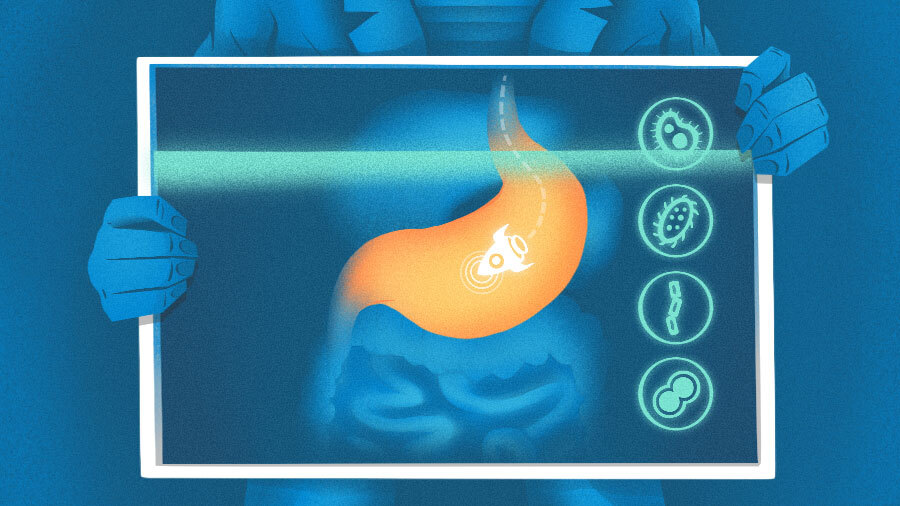Billions of microbial organisms—both good and bad—live in our guts.
Subscribe to the Crunchbase Daily
With research increasingly showing that the microbiome plays a large part in overall human health, more startups are launching in the field and venture investors have pumped $1 billion into U.S. companies working on gut microbiome projects in the past five years, according to Crunchbase data.
“Research on the gut microbiome is extremely compelling, but it is still nascent and requires more,” Michael Lavin, founder and managing partner of Germin8 Ventures, told Crunchbase News. “Companies are leveraging that research to make certain claims, including that some chronic illnesses are from a lack of diversity with the microbiome. Other research is looking into using the gut microbiome to diagnose disease.”

Just getting started
Research on how the gut microbiome affects a person’s overall health is fairly new. The National Institutes of Health supported the Human Microbiome Project from 2007 to 2016.
A well-known study in 2014 centered around transplanting the microbiome of an obese mouse into a lean mouse and vice versa, in what Katz called “the moonshot heard around the world.” Not only did the luster of the mouse’s fur get better with the lean microbiome, but markers of aging improved.
Then in 2016, President Barack Obama’s administration created the National Microbiome Initiative aimed at understanding the microbiome and how it could be used in the areas of health care, food production and environmental restoration.
“The Human Genome Project was the inflection point for genomics, and Obama’s project did the same for the microbiome after key publications and discoveries were made,” Ara Katz, co-founder and co-CEO at Seed Health, said in an interview. “People started to care when they discovered that the microbiome could help you get thinner, look better and live longer.”
However, research on the microbiome, like the one with the mice, gets conflated with gut health. In this instance, it’s very rare to see a scientific field this early in its trajectory have such public awareness, Katz said.
“We already know that a diverse plant fiber leads to a diverse gut microbiome, and we know there isn’t one healthy microbiome, but billions,” she added. “People are starting to understand there are actionable things they can do to impact their health that don’t require 20 years of science.”
Startups are doing research themselves to figure out what the microbiome can do, and a number of products are already in the market and commercialized. These include analyzing how microbiomes work, creating probiotics, and at-home testing kits where users provide a stool sample. A lab sequences the sample and recommendations are made, such as what supplements to take to balance the microbiome.
Sunnyvale, California-based Thryve touts itself as “the first consumer gut health program,” providing microbiome sequencing tests and personalized recommendations for food ingredients and customized probiotic formulas under its brand, said Sarah Daniels, Thryve’s lead research scientist, via email.
The company has raised $1.4 million in venture capital since forming in 2016, according to Thryve’s Crunchbase profile, and its goal is to improve the microflora over time by promoting retesting among customers after introducing a new intervention.
There are a number of at-home testing providers, and Daniels said the landscape has diversified beyond just genetic sequencing.
“Other markets now span from testing for environmental exposure to at-home diagnostics,” she added. “These emerging niches complement sequencing ventures and build a broader picture of wellness for consumers. It’s fantastic to see other new entrants in this space to help foster a greater culture of at-home testing for an even wider audience while also driving down costs to improve accessibility for all of those who are interested.”
Food as medicine
Another aspect of research around the gut microbiome involves the concept of “food as medicine.”
Venice, California-based Seed Health formed in 2016, launched its first consumer probiotic in 2017, and then its first therapeutics work in 2019, Katz said. It has raised an undisclosed amount of seed funding, according to Crunchbase data.
There is a deeper understanding of not only the gut, but other microbiomes, too, she said. That includes, for example, how a child’s digestive system develops and if that leads to allergies or asthma.
“It also confirms thinking people have of moving away from traditional medicine,” she said. “Hippocrates is famous for saying, ‘All disease starts in the gut.’ The belief is that the gut connects to all systemic health.”
Matt Walker, managing director at S2G Ventures, agrees. He sees food being a tool for health and wellness, and his firm has invested in startups working in this space, such as Solarea Bio, he said in an interview. Solarea was formed in 2017 and is developing new microbiome-based applications for inflammation in the gut. It has raised about $11.2 million in venture-backed funding.
There is a new wave of general wellness that bridges food and medicine, where some food-based ingredients have equal efficacy on par with medicine, he said.
“We see a lot of companies, but everyone’s microbiome is different and has individualized solutions, so distribution channel issues make that a different endeavour,” Walker added. “You need to find a series of products that can be given to a wide variety of people.”
What’s next
It’s no secret that most supplements carry a caveat that certain statements made on the bottle were not evaluated by the U.S. Food and Drug Administration, nor are they intended to diagnose or treat disease.
The gut microbiome industry heavily relies on evidence-based research to drive the field forward, Daniels said. Thryve, for example, uses it as a directory for reporting the function of each microbe reported in the customer’s sample.
Katz acknowledges that there needs to be more precision in the field and that progress has been faster than originally expected. She believes the market is just getting started and certain aspects of the field are crowded, like probiotics, while there is more to be done on the biotherapeutics side.
“As we move toward more solutions that get approved by the FDA, like women’s health, that trickles down for people understanding there is real potential,” Katz said. Hopefully as science advances, there will be clear distinctions between evangelism and evidence.”
Meanwhile, Germin8’s Lavin cautions that some companies in the space are marketing their products with little evidence that they actually enhance health. In addition, it is not yet known how sustainable certain supplements are in the body.
For example, not all probiotics are sustainable: many die before they reach the appropriate part of the gut, he said. In addition, humans share approximately 10 percent of the microbiome, so customized options will be key.
“We are not interested in snake oil supplements or table stakes solutions, we want people to reap the full benefits,” Lavin said. “There is still a lot to do here. We see this space like companies that use a satellite to map. We are in the 1.0 phase, and we are looking for the ‘Waze’ to come along and be the step-by-step coach to tell people where they need to go. That will be the success of this sector.”
Illustration: Dom Guzman

Stay up to date with recent funding rounds, acquisitions, and more with the Crunchbase Daily.






![Illustration of a guy watering plants with a blocked hose - Global [Dom Guzman]](https://news.crunchbase.com/wp-content/uploads/quarterly-global-3-300x168.jpg)
67.1K Followers